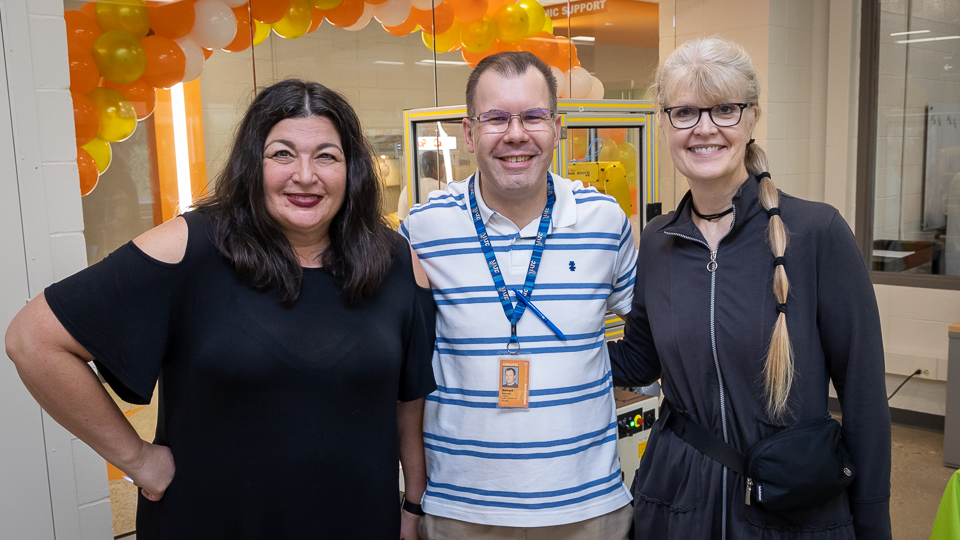
MATC STEM instructors Christine Ryan, Ph.D., Jim Kerschen, Ph.D., and Lisa Conley, Ph.D.
I believe MATC is critical to the success in the state’s biohealth endeavors. We’re doing things in that space that are making a real impact.
Milwaukee Area Technical College could soon enhance and expand its biohealth program offerings thanks to federal funding secured this month.
The Wisconsin Biohealth Tech Hub, a Milwaukee-Madison collaboration to position Wisconsin as a global leader in personalized medicine, has been awarded $49 million to drive that collaboration forward.
Wisconsin's tech hub was one of 12 across the country to win a share of $504 million in funding designed to supercharge innovation. The state's proposal beat out 19 other finalists that were initially selected from more than 370 applicants across 49 states.
"This is a groundbreaking opportunity for Wisconsin, MATC and the consortium," said MATC President Vicki J. Martin, Ph.D. "We are committed to expanding our biohealth programs and focused on equipping our diverse student body with the skills needed for careers in Wisconsin's growing Tech Hub."
Read about the $49 Million awarded for Wisconsin Biohealth Tech Hub
The consortium includes MATC, the Wisconsin Economic Development Corporation, BioForward Wisconsin, Exact Sciences Corporation, Accuray, Plexus, GE HealthCare, Rockwell Automation, WRTP Big Step, Employ Milwaukee, Madison Area Technical College, the University of Wisconsin System Administration, the University of Wisconsin-Madison, the Madison Regional Economic Partnership and Milwaukee7.
“It is a great honor that MATC was selected to participate in this consortium,” said Christine Ryan, Ph.D., co-chair of MATC’s Biological Sciences program and an instructor since 2004.
The MATC team working with the consortium includes STEM instructors Garrison, Ryan, Marie Colmerauer, Lisa Conley, Edward (Jim) Kerschen and Scott Schlipp.
Being designated as a regional tech hub will allow a collaborative effort to advance research in personalized medicine and biotechnology, and create jobs in the cutting-edge field. Personalized medicine uses an individual’s genetic profile to guide medical decisions about the prevention, diagnosis and treatment of diseases.
The Biden administration described personalized medicine as "an emerging health care approach that tailors tests, treatments and therapies informed by a patient’s unique genetic code, medical record and environment."
 "This award will strengthen MATC's innovative educational programs that equip our diverse student body with the skills needed for careers in biohealth and personalized medicine," added Sheldon Garrison, Ph.D., a part-time Science, Technology, Engineering and Mathematics (STEM) instructor at MATC since 2009.
"This award will strengthen MATC's innovative educational programs that equip our diverse student body with the skills needed for careers in biohealth and personalized medicine," added Sheldon Garrison, Ph.D., a part-time Science, Technology, Engineering and Mathematics (STEM) instructor at MATC since 2009.Garrison, a health care and biotech expert who specializes in genetics and personalized medicine at Rogers Behavioral Health, suggested that by combining federal funding and strategic partnerships with other organizations, MATC could potentially expand its biohealth-related academic programs.
The college also will work with businesses in the consortium to assess labor needs, calibrate programs and deliver the skilled professionals to the workforce, Garrison said.
“Through this effort we are forging long-term agreements, collaborations and understandings with these companies so our students can look to these employers in the region and have roads to exceptional jobs that pay great salaries and have a profound positive impact on the future health care provided to all in need,” Dr. Garrison said. “I believe MATC is critical to the success in the state’s biohealth endeavors. We’re doing things in that space that are making a real impact.”
Plus, the next generation of jobs in the industry hasn’t even been developed yet, said Dr. Conley, an MATC STEM instructor for 19 years. “No one really knows what could be down the road,” she said. “There will be opportunities in the future that we don’t have right now. The possibilities for growth and impact are very exciting. We need to be prepared for that.”
Wisconsin’s biohealth industry is large, diverse and prosperous, according to a 2022 report compiled by BioForward Wisconsin, which is also part of the consortium. Nearly 52,000 employees across the state — 15,000 in the Milwaukee region — earned an average annual salary of $96,000 in 2021, 70% higher than the state’s private sector average, the report said.
“The growth opportunity for Wisconsin in biohealth is immense,” the report said. “Wisconsin has both historical and current strengths in medical device, biopharmaceutical, and other manufacturing and this moment represents a genuine opportunity for the state to implement a ‘Made in Wisconsin’ initiative for the biohealth industry.”
About MATC: Wisconsin’s largest technical college and one of the most diverse two-year institutions in the Midwest, Milwaukee Area Technical College is a key driver of southeastern Wisconsin’s economy and has provided innovative education in the region since 1912. More than 28,000 students per year attend the college’s four campuses and community-based sites or learn online. MATC offers affordable and accessible education and training opportunities that empower and transform lives in the community. The college offers more than 180 academic programs — many that prepare students for jobs immediately upon completion and others that provide transfer options leading to bachelor’s degrees with more than 40 four-year colleges and universities. Overwhelmingly, MATC graduates build careers and businesses in southeastern Wisconsin. The college is accredited by the Higher Learning Commission.

